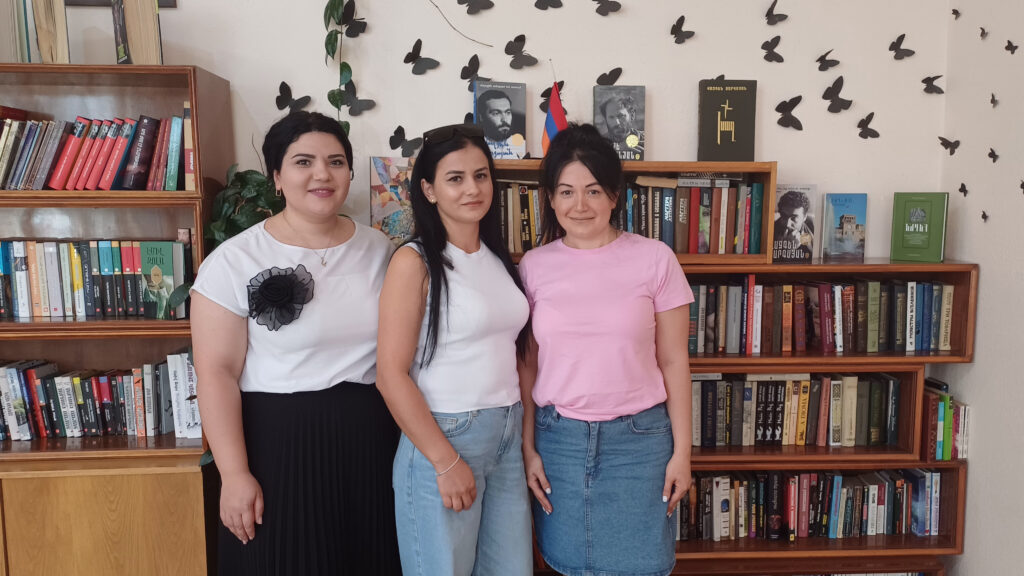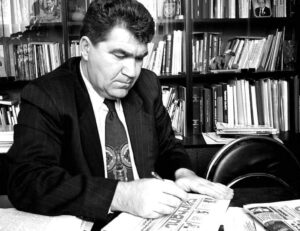
Language is the heart of who we are as a nation. Armenian language and literature are not merely channels for our history, culture and traditions; they are fundamental pillars of our identity. These elements shape our national pride, protect our heritage and provide a narrative thread that connects generations. In contemporary society, the importance of modern Armenian literature is clear. Today’s Armenian writers are not only preserving this heritage but also reshaping it to address contemporary challenges and new ways of thinking.
In the Erebuni administrative district of Yerevan, Armenia, a beacon of this literary revival is the number 11 library, which has been replenished with new books over the past three years. This has led to a surge in readers visiting the library. “Supply creates demand,” said Mary Hovhannisyan, an employee at the library. The library’s expanding collection has sparked interest across generations — visitors include school children, university students and older adults.
Despite the rise of electronic books and digital reading, the appeal of physical books persists, especially among younger readers. “We have young readers who come not only for the content but for the experience of holding and smelling the books. There’s something irreplaceable about the tactile experience of reading a real book,” Hovhannisyan said. Parents often bring their children during summer breaks, and once schools reopen, students arrive with reading lists but frequently explore other titles as well. “Agatha Christie is a popular choice among our younger readers, even though it’s not part of their required reading,” she added.
However, Armenian classics are still not as widely read as one might expect. One notable exception is Zabel Yesayan, whose works have seen renewed interest after being added to the school curriculum in Armenia. “Yesayan’s inclusion has definitely sparked curiosity, especially among younger readers. However, Armenian readers still tend to gravitate toward Russian classics, particularly Dostoevsky,” Hovhannisyan observed. This preference for foreign literature doesn’t overshadow the library’s efforts to promote Armenian authors. When readers come in without a specific list, the staff prioritizes recommendations of Armenian writers.

Ruben Esayan, a new voice in Armenian literature
One author gaining significant attention is Ruben Esayan, a young writer whose latest book, Monks Have Secrets, quickly sold out after its release. His book release earlier this year attracted a large crowd, indicative of a growing appetite for contemporary Armenian literature. Esayan, a fan of entertainment literature since childhood — especially in the genres of mysticism and detective fiction — is carving out a space for himself in the Armenian literary world.
His debut novel, 13 km from the Tunnel, was the first Armenian horror-thriller, a risky venture as this genre was previously unexplored. “There wasn’t really a precedent for this type of book in Armenia, so I wasn’t sure how it would be received,” Esayan said.
His second novel, Monks Have Secrets, is set in the United States and follows a group of Armenian youth who study and live together, intertwining their lives with a local monastic community. “In a typical detective novel, the mystery revolves around discovering the criminal or murderer,” Esayan explained. “But my book also carries an educational dimension. The monks’ secret is a central plot point, but I’ve layered the story with themes about human relationships and spiritual values.”
Esayan’s innovative marketing strategy included using social media to introduce his characters prior to the book’s release, generating buzz among readers. He shared descriptions of his characters’ appearances and personalities, allowing readers to visualize them before the book hit the shelves. This approach, blending traditional storytelling with modern marketing tactics, has proven effective. “The feedback was overwhelmingly positive. People liked having a visual reference for the characters, but I left plenty of room for their imagination since there are no illustrations in the book,” he said.
Esayan has worked hard to make his books accessible and engaging for readers of all ages. He receives letters from readers who had never finished a book before but couldn’t put his book down, as well as from retirees who completed his latest work in a single day. His ability to connect with such a broad audience is a key factor in his success.
Looking ahead, Esayan revealed that a film adaptation of 13 km from the Tunnel is slated to begin production in the summer of 2025. He encourages young writers to take risks and not be afraid of failure. “Many young people hesitate to write, because they’re afraid it won’t turn out well. But I always tell them to try. If it works, great. If not, that’s okay too. The important thing is to believe in yourself and seek feedback to improve,” he said.

Abgar Apinyan on the crisis in Armenian literary criticism
Abgar Apinyan, president of the Pan-Armenian Writers’ Union, sees a significant issue facing Armenian literature: the absence of strong literary criticism. He argues that without it, Armenian literature risks becoming disconnected from its readers. “Armenia is home to rich literary works, yet much of our population remains unaware of them,” Apinyan noted, emphasizing the lack of well-developed literary critique in today’s magazines and websites. “Literary criticism is vital for the health of literature. If we had proper critique, our modern literary works would not be so unfamiliar, even to literature students.”
Apinyan highlighted contemporary writers such as Aghasi Ayvazyan, Vahe Oshakan and Levon Khechoyan, as well as poets like Razmik Davoyan and Alisa Kirakosyan. Despite their rich contributions, many of these figures remain largely unknown, even within academic circles.
For Apinyan, marketing and sales should not be confused with literary value. “Good marketing is not a measure of artistic quality,” he stressed, criticizing the current focus on marketability and superficial success. He called for a return to nurturing the artistic essence of literature.
Apinyan also underscored the importance of freedom in both creation and critique. “Freedom doesn’t mean doing whatever we want — it means liberation from servility,” he stated, highlighting the need to maintain human values and artistic integrity, as exemplified by Armenia’s classical writers.
His hope is that modern Armenian literature will gain the recognition it deserves, supported by thoughtful criticism that showcases its world-class contributions.


Be the first to comment